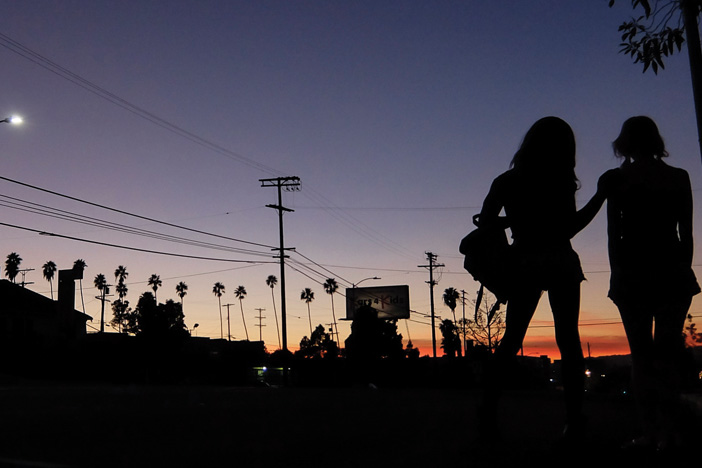Tangerine made for some classic, if lengthy, clickbait headlines when it premiered at Sundance earlier this year: “What a Film about Transgender Sex Workers Shot Entirely on an iPhone Looks Like!” While these two aspects are certainly intriguing and make for great marketing material, there’s more going on in the fifth independent feature from director Sean Baker.
Tangerine follows two best friends in Los Angeles, Alexandra (Mya Taylor) and Sin-Dee (Kitana Kiki Rodriguez), the latter furiously hell-bent on finding her two-timing boyfriend Chester (the skeezy but lovable James Ransone). We follow the pair down Santa Monica Boulevard on Christmas Eve as Sin-Dee interrogates various members of their community – mostly sex workers and drug dealers. In the pair’s bid to track down the Other Woman – a defenceless, stick-thin coke addict named Dinah (Mickey O’Hagan) – the duo ignite a melodramatic yet undeniably hilarious series of confrontations. The emotional fireworks are more cathartic than catastrophic, though, with a doughnut-shop-set climax that is both silly and naturalistic.
Intersecting Sin-Dee’s drama are two other storylines involving Armenian cab driver Razmik (Karren Karagulian, a Baker regular), who cruises Alexandra’s strip, eventually picking her up, and later going home to a sheltered family that is utterly oblivious to the demanding nature of his job and his private life.
Although Tangerine is not built on a particularly complex narrative, it takes opportunity at every moment to shine a light on the real community that novice actors Rodriquez and Taylor actually come from. That attention to detail and realism comes from Baker’s from-the-roots-up approach, which involves months of research and collaboration with the people he befriends in niche subcultures. Many of the details in the script, such as Alexandra’s interactions with a non-paying customer and uncaring cops, emerged out of anecdotes from the actors’ friends who worked in the sex trade. This givesTangerine both a cultural specificity (e.g., lingo, such as Alexandra and Sin-Dee calling Dinah a “fish” for having been born with a vagina) and a refreshing honesty that doesn’t hold back from revealing the abrasive, frequently-non-PC dynamic between sex workers, pimps and drug dealers.
And yes, the film may have been shot on an iPhone, but other than the nearly fish-eyed degree of framing, it’s impossible to discern (Baker and cinematographer Radium Cheung explored different techniques and used yet-to-be-released technology to achieve the anamorphic ratio). It’s beautifully shot, earning its title with its sun-scorched asphalt, while Baker’s cameras – er, iPhones – are frequently playful, using frenetic roaming shots to capture the minutiae of Highland Avenue and Santa Monica Boulevard, an area known for its transitioning male-to-female prostitutes.
Baker reveals an unyielding, impoverished subculture that is rarely represented in cinema, and shows how women like Alexandra and Sin-Dee survive – it’s thanks to a shared fortitude, wicked sense of humour and a friendship that can’t be broken, even when severely tested. Razmik’s involvement is also fascinating, exposing the embarrassing and emotional fissures when his not-so-understanding family finds out his so-deemed perverse predilections. Tangerine is not interested in criticizing his appetite, though it’s fascinating how the movie shows the collision between the prejudiced, uptight Armenian family and the laid-back sex workers – two worlds that couldn’t be more different. The scene exposes Razmik’s deep, abiding shame as a john, contrasting the secretive nature of his family against the brutal honesty apparent in Sin-Dee and Alexandra’s world.Tangerine ultimately poses a question: Which group is worse off in the end?

